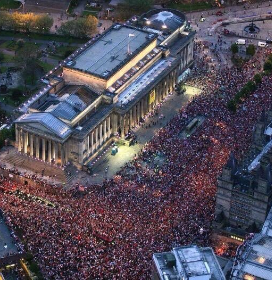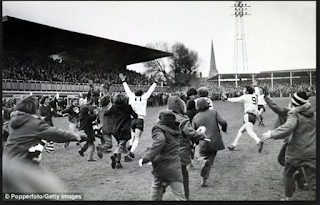Nearly one-hundred and twenty years ago, The New York Times adopted the motto,
"All the news that's fit to print," on its front page. It was a declaration
of the newspaper's intention to report the news impartially. Not being a reader
of The New York Times, I cannot speak
for how well it has met this goal, but if does, then it probably stands as one
of the few publications that can claim to be impartial. Most people probably
believe that the media is biased, or at least reports news with a particular
slant. Whether this is real or perceived, depends largely on your own
viewpoint, prejudices and beliefs, and how much the reporting supports or reinforces
your view.
It would be difficult to pick up a British national
newspaper and not be able to divine its political leanings, so to criticise the
Daily Mail for being right-wing, or The Guardian for being left of centre is
akin to criticising water for being wet. Not that The Guardian has always been left-wing: it was a fierce critic of
Labour politician Aneurin Bevan and opposed the creation of the National Health
Service - but reading it today, one could scarcely confuse it with the Mail or the Express in terms of its political agenda. Then we have the BBC,
which, despite its famed commitment to impartiality, frequently attracts
criticism from left-wing or right-wing commentators or groups over supposed
bias - although I find it both comforting and amusing that it sometimes
receives censure from both sides over the same story. The BBC's guidelines on
impartiality actually state that, "
impartiality is often more than a simple matter of 'balance' between opposing
viewpoints. Equally, it does not require
absolute neutrality on every issue " which suggests that although it
may be neutral on certain subjects, that does not guarantee that every story on
a given topic will be completely balanced or impartial, giving rise to the
opportunity for "Angry of Tunbridge Wells" to vent their spleen over
a story that does not at least recognise, if not endorse, their world view.
Despite the obvious spin that the media applies to their
reporting, one can generally be reassured that most of the stories that one
reads have a grain of truth in them - or at least one used to be able to. With
the internet increasingly becoming the primary source of news for many people,
applying our critical faculties to the stories we consume is becoming
increasingly important, especially when Facebook is more and more likely to be
that source. Facebook received complaints in the aftermath of Donald Trump's
victory in the US Presidential election that fake news stories that had
appeared on the social media network had influenced the result, including the
false assertion that actor Denzel Washington had praised - and thereby
implicitly endorsed - Trump. Once stories like that gain traction they become
difficult to stop, and the fact that on the face of it they are plausible
enough is sufficient for most people not to question them. The claim that
Trump's opponent, Hillary Clinton, was leader of a paedophile ring was another
false story that circulated, but being so outlandish was probably believed by a
much smaller number than would have accepted the story about Denzel Washington
at face value.
Because of the criticism levelled at Facebook - and with the
usual reaction that organisations indulge in by immediately feeling the need to
'do something' regardless of how useful it is - it immediately announced that
it would be introducing methods to detect misinformation and display warning
labels for fake content, a move which prompted Google to announce that it would
take steps to prevent fake news sites from making money through
advertising. Google Chrome already has extensions like Fake News Alert that
point out the potentially false stories, although it is so basic that all it
does it display a warning when visiting certain sites and does not distinguish
between the satirical and the supposedly genuine.
 |
| Helpfully, the Fake News Alert extension points out that this obviously spoof site may contain information that is false or misleading... |
The danger with extensions like Fake News Alert, or with
Facebook's initiatives are that not only do they potentially reduce still
further the scepticism, or bullshit filter, we should ourselves apply to
everything we read, they may also throw the baby out with the bathwater by
blocking or otherwise discouraging the genuinely amusing but obviously spoof
sites like The Daily Mash, The Onion,
Southend News Network or The Suffolk
Gazette. I have to confess that on my first encounter with Southend News Network - a story about a
restaurant charging corkage to breastfeeding mothers - I was initially unsuspecting
enough to accept it at face value...for about five minutes, after which time disbelief
crept in and scouting around the rest of the website drew me to the inevitable
conclusion that this was a joke. But supposedly greater minds than mine were
duped by the story the same site ran that the M25 would closed for several days
for an endurance race. This was reported on LBC and BBC Radio, albeit that while
Katie Hopkins on LBC fell for it, the BBC were - despite believing it at first
- more quickly able to see it for the humorous spoof that it was.
 |
| ...but not this one, which may be why people were duped by this completely plausible story. |
More insidious are the stories that appear - particularly on
Facebook and Twitter, but undoubtedly elsewhere too - that come not from media
outlets but from "the public." Jeremy Corbyn's rally in Liverpool in
August this year was undoubtedly well supported - estimates put the crowd as
anywhere from five to ten thousand - but not as well supported as this picture,
which was widely shared on Twitter and Facebook and which purports to be from
the same rally, suggest.
And that is because the picture was taken eleven years ago,
and shows Liverpool Football Club supporters welcoming the team home after
their Champions League victory against Milan. Similarly, pictures appeared
during Donald Trump's election campaign, purporting to show a rally in Portland
but which was actually an earlier rally in Cleveland, while a Clinton rally in Florida
was also reported with an identical picture as that of an event in New York.[1]
Reverse Googling images is always a good way to start if you are sceptical
about the veracity of a picture story, although I think we all know that just
because an internet search appears to validate a story when it appears on
multiple sites, that is no guarantee of its veracity - there's enough
plagiarism and lazy reporting out there for that to be the case.
Despite the fact that ultimately it is our own individual
responsibility to question some of the potentially dubious stories that we see
- especially outside the more responsible news outlets - there is no harm in
Facebook or Google pointing us in the right direction, although I'd draw the
line at outright censorship. All the news may not be
fit to print, but is that a decision that Facebook and Google should be making
for us?




















